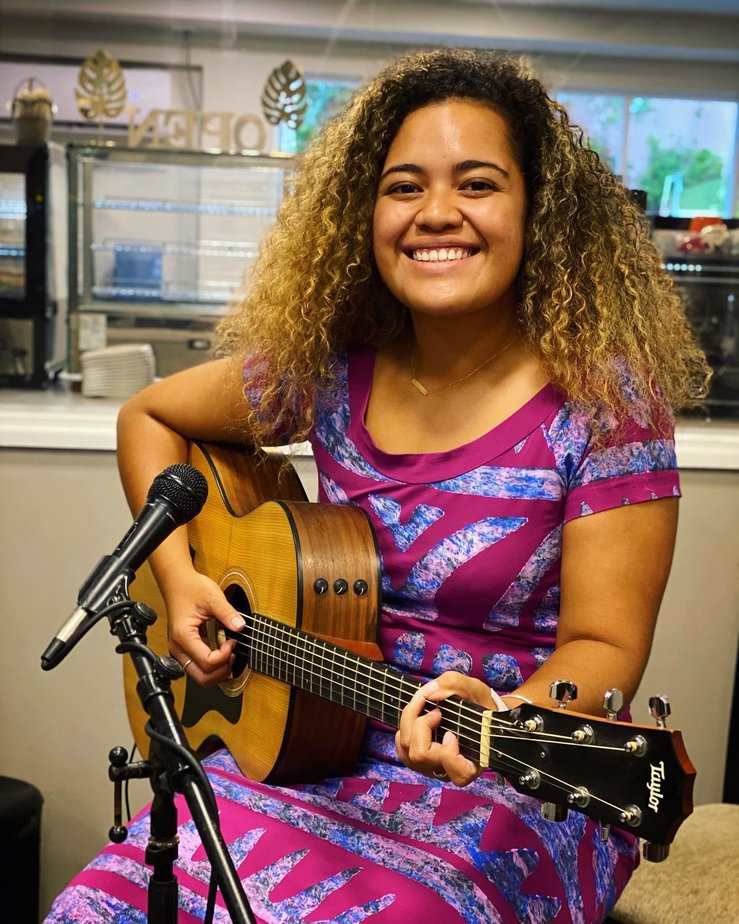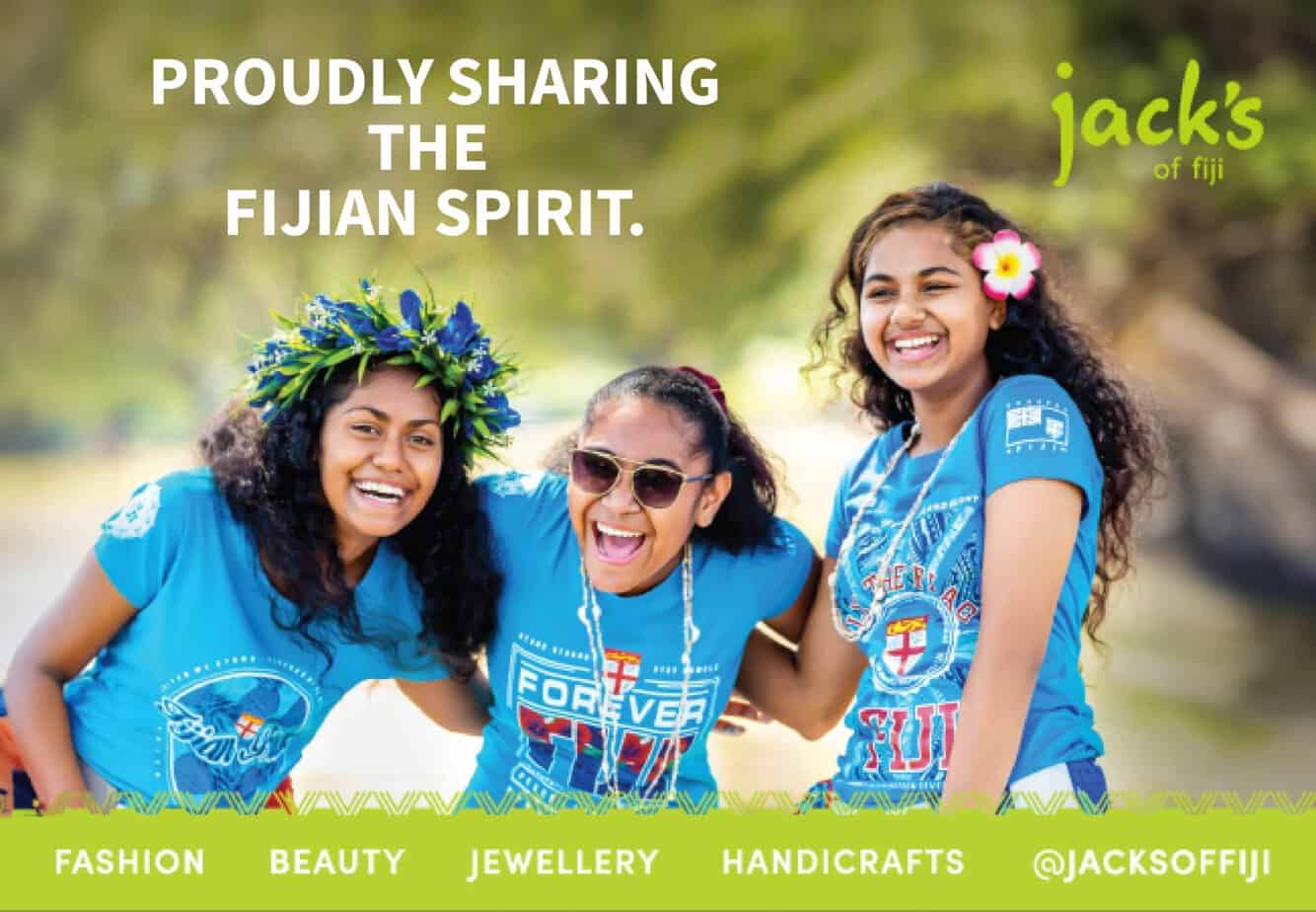By Rowena Singh
“Performing is more than just me standing up and singing a song in front of people; it is a chance for me to share a vision and a mission,” says Tonga’s Mia Kami.
Kami’s original songs are full of meaning, delivered in her warm, effortless voice.
A student at the University of the South Pacific, an activist and a musician, Kami is passionate about indigenous knowledge, climate activism and decolonising the mind.
Kami, who currently calls Fiji home, says her zest and inspiration for music and activism, comes from her father, Taholo, himself a well-known climate, oceans and community activist.
“He taught me my first chords on the guitar, he always encouraged me to sing for people and to keep writing songs. We also share similar passions, so we have these big discussions together. Although, not always in agreement, they’re still great discussions nonetheless!”
“It was those discussions that helped develop my interest in using music as a means of sharing how I felt about certain issues.”
“My dad would always tell me to sing at his meetings and I’d have to find songs about change or hope or anything that would fit the theme of the meeting,” says Kami. “As I started getting into songwriting, I realised I could actually write my own songs about change!”
Kami says that she sees music, and art in general, as a beautiful way to shed light on issues.
“As I got older, I started to find more and more songs about activism and I realised that I can do the same thing too,” says Kami. “I had written my first “activist song” in 2018. It’s called “History” and it’s a song about how we need to move forward together to help make a difference. After I had written it, I remember feeling this strong emotional connection to it after I sang it for the first time.”
Kami says that she was surrounded by music growing up.
“I grew up singing with my late sister, Tae,” says Kami. “She would always tell me to sing with her and at the time, I never really wanted to, but she would insist. She would tell me that God has blessed me with a gift and I should not be afraid to share it. After she passed away, I started learning the guitar because it was one of the things that made me feel connected to her.”
“This is my mana, my spirit, my soul”
Kami says that indigenous and climate activism is something she has practiced over the past five years, and that it has grown into a deep passion for the work she does today.
She says that her USP politics class taught her to learn about the Pacific and the history of colonisation through a Pacific lens.
“I was suddenly taught a narrative I was never really exposed to before,” says Kami. “I guess you could say my politics classes “radicalised” me in such a way that it just naturally weaved its way into my music.”
“Our ancestors were forced to adapt to a new way of life that was unfamiliar to them,” says Kami. “So much of our culture and traditions that were beautiful were lost.”
“When I talk about decolonising the mind, I’m referring to the unlearning of certain behaviors or thoughts that are, at its core, colonial ways of thinking. This could be applied to the way our Pacific leaders interact with each other.”
“For example, traditional forms of leadership: we start asking ourselves, how can we steer away from the rigidity of colonial ways of discussion to reignite a structure of decision making that is focused on interconnectedness, maintaining relationships and respecting each other as Pacific brothers and sisters? In the end, it’s about challenging how we think and how we do things. How colonised were we and how colonised are we going to stay?”
Kami’s song “Mana” is a soulful acoustic number which she wrote in 2018 before a trip to San Francisco for the Global Climate Action Summit.
“I remember that year I was learning about the importance of reclaiming our narratives and telling our stories with our true, authentic voices,” says Kami.
“There was this one point where we were learning about how the colonisers were basically dictating how the rest of the world was going to see “the colonised peoples” and all I could think about was how my ancestors were storytellers, not writers, and so our history was written by white men.”
“At that point, all I could think was, ‘Why do we accept definitions of how our people should be?’, and I thought, ‘man, I have to write a song about this’.”
“This song is so deep for me because it comes from a place of hurt and hope. Hurt from how much of my culture was lost and how little writings there are about my culture before colonisation; but also hope for a future generation that reclaims their narratives and decides how they want to define themselves as indigenous and people of the Pacific.”
The response to “Mana” was overwhelming.
“This song is almost like an anthem where I’m channeling the mana of my ancestors and letting that strength push me forward as a woman of the Pacific,” says Kami. “It’s not a song that comes from an angry place, it’s a song that I hope Pacific people can listen to and feel that our stories can still be told.”
Kami’s songs have been played on Fiji and NZ radio stations.
“Fiji’s local radio station, LegendFM, has been a great supporter. They invited me to their show Local Vocal twice now, where I’ve had the opportunity to do live versions of my songs. Those live versions then get radio play, which I’m still not used to. I’ll be in the car, I’ll turn the radio on and hear my voice!”
Kami says while gigs are a source of income for her, it isn’t something she depends on as her main source of income.
“Right now, I see my music as being a part of my activism and a way for me to tell stories, whether it’s about indigenous sovereignty or climate change or an attractive person I saw in uni,” says Kami. “I’d like to continue building my artistry a bit more before I consider doing music full time.”
Kami says that one of her most successful music projects would be a video she did together with 350 Fiji.
“I performed “Mana” as a poem instead of a song and the video was directed by local videographer, Ropate Kama,” says Kami. “The video was for the five-year anniversary of the Paris Agreement and the response to it was amazing! And I loved the way Ropate was able to really portray the vision I had with the words of the song.”
Kami is also the co-coordinator of 350 Fiji, which is the Fiji branch for 350.org. 350 is an “international movement of ordinary people working to end the age of fossil fuels and build a world of community-led renewable energy for all.”
350.org is committed to inspiring climate action and justice in local communities.
“Since I’ve become a part of the team, we’ve been able to host different series of events to inspire the community into learning how they can do their part in this fight against the climate crisis,” says Kami.
“Last year, we launched a Just Recovery Community fridge where people donate fresh fruits and vegetables for others to come and take for free. This particular project was to encourage members of the community to practice sustainable living and to recognise the equal redistribution of resources to members of the community who need it.”
Kami says that the COVID pandemic dampened her ‘amazing lineup’ of overseas events where she planned to perform her music and meet sound engineers to work on an EP; “when the borders closed all of that had to be cancelled.”
“I also had a hard time getting gigs because local businesses were still trying to pick themselves up again,” says Kami. “The uncertainty of COVID in the early period was definitely the hardest because no one knew what the rest of the year was going to look like.”
Post-COVID, Kami hopes to go back to Tonga and do her part for her country there.
“Whether it’s through music or working as a civil servant,” says Kami. “I just hope I can continue to use my music as a means of sharing my passion for the work I want to do. I also hope to build my artistry by continuing to build my network and meet people I have been having discussions with over Zoom!”
This article was first published in Islands Business in July, 2021.



